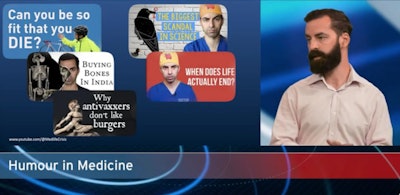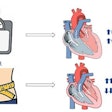Taking a light-hearted approach at work can promote well-being among fellow professionals and patients, but you should never make a joke that might offend the patient. That's the view of cardiologist, YouTuber, writer, and comedian Dr. Rohin Francis.
"Avoid any jokes relating to patients. There are always other safer targets to make fun of, like cardiac surgeons or nephrologists!" he said in a recent ESC TV Today podcast about using humor in medicine. "I've seen it go wrong. This is where colleagues have been trying to make the rest of the team laugh rather than make the patient laugh. You have to involve the patient in the joke rather than use them as a prop in the joke."
Keep education your priority, he urged. "I will start off with a purely educational script which is quite serious and then I'll add to it. If you're maintaining some kind of educational focus, you won't stray too far."
There are some settings and interactions where jokes are not going to be appropriate. "If you feel that humor doesn't come naturally to you, I don't want anyone to try and shoehorn it into their interactions. But there's a body of evidence suggesting that humor can have a genuine effect on patients' experiences," noted Francis, a consultant cardiologist at the Essex Cardiothoracic Center in Basildon, U.K.
 Dr. Rohin Francis from the Essex Cardiothoracic Center will be on stage at the upcoming ESC annual congress in London.
Dr. Rohin Francis from the Essex Cardiothoracic Center will be on stage at the upcoming ESC annual congress in London.
"Good medicine and bad jokes -- much better than the other way around," is the motto of his YouTube channel Medlife Crisis, which aims to provide medical and scientific education in an understandable way.
Francis explained how he finds humor can be particularly helpful in the conference setting to make dry topics more memorable and accessible – and in interactions with patients to establish rapport and empathy. He also leverages humor in a slightly more deliberate way on the internet. "I've started using humor in science communication to a general audience as well. So if I can tell some bad jokes and trick someone into watching a one-hour-long video about medical statistics, then I think that's quite useful."
He cited three main ways in which humor can improve the doctor-patient relationship:
- To establish rapport.
- To alleviate tension or diffuse a situation. For example, if starting a consultation late, empathize and show that you understand that the patient has had to wait for a long time.
- To make what you're saying to the patient a bit more accessible and memorable.
"It can be challenging striking the right balance and I do sometimes worry that patients might see some of my antics online and lose trust. But actually I've found that the opposite has been true. I think patients really enjoy seeing a doctor with a personality. It helps them relate to you," Francis noted.
Finally, he said humor can encourage creativity or out-of-the-box thinking amongst clinicians, particularly for young trainee specialists who may feel like they're on a conveyor belt of conference presentations, exams, and PhD research.
"I freely admit I struggled with some of those things. I'm just an ordinary cardiologist without much academic prowess, but I have been able to develop this side interest. It is really important to have a creative outlet, whatever that may be," Francis noted. "And I think now especially with the pandemic, a lot of younger doctors are thinking about having a varied career and balancing interests outside of work."
You can watch the full interview with Dr. Francis on the ESC website. It begins 13 minutes 20 seconds into the episode. Also, he will be on the ESC TV stage at the ESC annual congress, to be held in London from 30 August to 2 September 2024. He will give two appearances a day from Friday to Sunday.




















